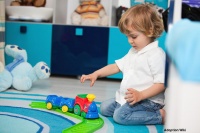Difference between revisions of "Adoption Parenting"
| Line 3: | Line 3: | ||
Now that you have [[adopted]] a child and life is beginning to settle down, you may find your thoughts moving to the future. When shall I tell my child that s/he is [[adopted]]? How will s/he feel about it? At what point will s/he want more information? What will s/he want to know from me? How can I help my child feel comfortable about being [[adopted]]? | Now that you have [[adopted]] a child and life is beginning to settle down, you may find your thoughts moving to the future. When shall I tell my child that s/he is [[adopted]]? How will s/he feel about it? At what point will s/he want more information? What will s/he want to know from me? How can I help my child feel comfortable about being [[adopted]]? | ||
| − | Whether children are [[adopted]] as infants or when they are older, whether they are healthy or have physical or psychological problems, their adoption is bound to influence their development. You need to understand how and why. | + | Whether children are [[adopted]] as infants or when they are older, whether they are healthy or have physical or psychological problems, their [[adoption]] is bound to influence their development. You need to understand how and why. |
Learning about the developmental stages of children and what can be expected in each stage is important to all new parents. When your child has been [[adopted]], there are additional considerations. In these pages, we will be looking at specific issues—separation, [[loss]], anger, [[grief]], and identity—and show how they are expressed as your [[adopted]] child grows up. Some of these issues will be obvious in all stages of development; others surface at specific times. The more thoroughly you can understand how your child behaves and why, the more likely it is that you can be supportive and help your child to grow up with healthy self-esteem and the knowledge that s/he is loved. | Learning about the developmental stages of children and what can be expected in each stage is important to all new parents. When your child has been [[adopted]], there are additional considerations. In these pages, we will be looking at specific issues—separation, [[loss]], anger, [[grief]], and identity—and show how they are expressed as your [[adopted]] child grows up. Some of these issues will be obvious in all stages of development; others surface at specific times. The more thoroughly you can understand how your child behaves and why, the more likely it is that you can be supportive and help your child to grow up with healthy self-esteem and the knowledge that s/he is loved. | ||
| Line 25: | Line 25: | ||
[[File:Shutterstock 84708676.jpg|thumb|160px|left]] | [[File:Shutterstock 84708676.jpg|thumb|160px|left]] | ||
====[[Preschool: Adoption and Child Development| Adoption and Child Development]]==== | ====[[Preschool: Adoption and Child Development| Adoption and Child Development]]==== | ||
| − | It is important to understand the typical developmental tasks and needs of preschoolers, as well as how adoption-related experiences may affect your child. | + | It is important to understand the typical developmental tasks and needs of preschoolers, as well as how [[adoption]]-related experiences may affect your child. |
====[[Preschool: Communication About Adoption|Communication About Adoption]]==== | ====[[Preschool: Communication About Adoption|Communication About Adoption]]==== | ||
| − | Parents who project an attitude of acceptance and comfort with adoption are better able to help their children explore their own feelings and fears. | + | Parents who project an attitude of acceptance and comfort with [[adoption]] are better able to help their children explore their own feelings and fears. |
====[[Preschool: Discipline Considerations| Discipline Considerations]]==== | ====[[Preschool: Discipline Considerations| Discipline Considerations]]==== | ||
The purpose of discipline is to teach, re-teach, and assist children in developing their own internal controls. | The purpose of discipline is to teach, re-teach, and assist children in developing their own internal controls. | ||
| Line 34: | Line 34: | ||
[[File:Shutterstock 83070964.jpg|thumb|200px|left]] | [[File:Shutterstock 83070964.jpg|thumb|200px|left]] | ||
====[[Grade School: Understanding Child Development and the Impact of Adoption| Understanding Child Development and the Impact of Adoption]]==== | ====[[Grade School: Understanding Child Development and the Impact of Adoption| Understanding Child Development and the Impact of Adoption]]==== | ||
| − | School-aged children go through many significant developmental changes. It is important for parents to understand the typical tasks and needs of school-aged children as well as how adoption-related experiences may affect children. | + | School-aged children go through many significant developmental changes. It is important for parents to understand the typical tasks and needs of school-aged children as well as how [[adoption]]-related experiences may affect children. |
====[[Grade School: Communicating about Adoption| Communicating About Adoption]]==== | ====[[Grade School: Communicating about Adoption| Communicating About Adoption]]==== | ||
| − | Parents who feel good about adoption, are comfortable talking about it, and can openly acknowledge their child’s feelings are best able to help their children do the same. | + | Parents who feel good about [[adoption]], are comfortable talking about it, and can openly acknowledge their child’s feelings are best able to help their children do the same. |
====[[Grade School: Disciplining Effectively| Disciplining Effectively]]==== | ====[[Grade School: Disciplining Effectively| Disciplining Effectively]]==== | ||
The purpose of discipline is to teach children acceptable behavior and how to develop their own internal controls. Discipline should take into account your child’s abilities, learning styles, and family history. | The purpose of discipline is to teach children acceptable behavior and how to develop their own internal controls. Discipline should take into account your child’s abilities, learning styles, and family history. | ||
| Line 42: | Line 42: | ||
Being [[adopted]] can affect your child’s school experience. Peers may pose innocent questions that cause hurt feelings, or they may tease an [[adopted]] child about being [[adopted]]. | Being [[adopted]] can affect your child’s school experience. Peers may pose innocent questions that cause hurt feelings, or they may tease an [[adopted]] child about being [[adopted]]. | ||
====[[Grade School: Seeking Help for Mental Health Concerns| Seeking Help for Mental Health Concerns]]==== | ====[[Grade School: Seeking Help for Mental Health Concerns| Seeking Help for Mental Health Concerns]]==== | ||
| − | Adoptive families, like other families, sometimes need help to address mental health concerns. Sadness, anger, and behavior challenges are normal as children in grade school learn more about their family histories and come to terms with adoption. | + | Adoptive families, like other families, sometimes need help to address mental health concerns. Sadness, anger, and behavior challenges are normal as children in grade school learn more about their family histories and come to terms with [[adoption]]. |
==[[Adoption Parenting: Preteen]]== | ==[[Adoption Parenting: Preteen]]== | ||
| Line 56: | Line 56: | ||
Thirteen- to nineteen-year-olds experience rapid physical and hormonal growth. | Thirteen- to nineteen-year-olds experience rapid physical and hormonal growth. | ||
====[[Teenage Years: Communicating with Your Teenager About Adoption| Communicating with Your Teenager About Adoption]]==== | ====[[Teenage Years: Communicating with Your Teenager About Adoption| Communicating with Your Teenager About Adoption]]==== | ||
| − | [[Adopted]] teenagers wonder about their birth families and think about adoption more than most parents realize. They need parents who are comfortable talking about adoption, who aren’t threatened or hurt by the discussion, and who can help answer their questions and discover information about their pasts. | + | [[Adopted]] teenagers wonder about their birth families and think about [[adoption]] more than most parents realize. They need parents who are comfortable talking about [[adoption]], who aren’t threatened or hurt by the discussion, and who can help answer their questions and discover information about their pasts. |
====[[Teenage Years: Helping Your Teenager Communicate with Others About Adoption| Helping You Teenager Communicate with Others About Adoption]]==== | ====[[Teenage Years: Helping Your Teenager Communicate with Others About Adoption| Helping You Teenager Communicate with Others About Adoption]]==== | ||
| − | Being [[adopted]] can affect peer interactions. Teens are capable of more sophisticated understanding and discussions about adoption, but they can be quite narrow in their judgments. | + | Being [[adopted]] can affect peer interactions. Teens are capable of more sophisticated understanding and discussions about [[adoption]], but they can be quite narrow in their judgments. |
====[[Teenage Years: Disciplining Effectively| Disciplining Effectively]]==== | ====[[Teenage Years: Disciplining Effectively| Disciplining Effectively]]==== | ||
As teenagers assert their emerging identities and independence, while also navigating peer pressures, they frequently will test the boundaries of family rules. | As teenagers assert their emerging identities and independence, while also navigating peer pressures, they frequently will test the boundaries of family rules. | ||
====[[Teenage Years: Preparing Your Teenager for Adulthood| Preparing Your Teenager for Adulthood]]==== | ====[[Teenage Years: Preparing Your Teenager for Adulthood| Preparing Your Teenager for Adulthood]]==== | ||
| − | An important part of parenting teenagers is creating the conditions in which they can master adult tasks and take on greater independence. | + | An important part of parenting teenagers is creating the conditions in which they can master [[adult]] tasks and take on greater independence. |
====[[Teenage Years: Seeking Help for Mental Concerns| Seeking Help for Mental Concerns]]==== | ====[[Teenage Years: Seeking Help for Mental Concerns| Seeking Help for Mental Concerns]]==== | ||
For many [[Adopted Persons|adopted persons]], growing up in an adoptive family involves some additional complications and challenges. | For many [[Adopted Persons|adopted persons]], growing up in an adoptive family involves some additional complications and challenges. | ||
| Line 71: | Line 71: | ||
[[Adopted Persons|Adopted persons]] may deal with a range of issues at different points in their lives. | [[Adopted Persons|Adopted persons]] may deal with a range of issues at different points in their lives. | ||
====[[Young Adults: Openness, Searching, and Access to Family History| Openness, Searching, and Access to Family History]]==== | ====[[Young Adults: Openness, Searching, and Access to Family History| Openness, Searching, and Access to Family History]]==== | ||
| − | Being placed for adoption does not necessarily mean an [[adopted]] person will never be able to contact his or her birth parents again. | + | Being placed for [[adoption]] does not necessarily mean an [[adopted]] person will never be able to contact his or her birth parents again. |
====[[Young Adults: Managing Adoption Issues| Managing Adoption Issues]]==== | ====[[Young Adults: Managing Adoption Issues| Managing Adoption Issues]]==== | ||
| − | Most [[adopted]] adults overcome any adoption-related issues they experience during childhood and adolescence and are as well-adjusted as nonadopted persons. | + | Most [[adopted]] adults overcome any [[adoption]]-related issues they experience during childhood and adolescence and are as well-adjusted as nonadopted persons. |
====[[Young Adults: Additional Resources| Additional Resources]]==== | ====[[Young Adults: Additional Resources| Additional Resources]]==== | ||
| − | Several nonprofit membership [[organizations]] provide education, advocacy, and support for families touched by adoption. | + | Several nonprofit membership [[organizations]] provide education, advocacy, and support for families touched by [[adoption]]. |
=Additional Information About Adoption Parenting= | =Additional Information About Adoption Parenting= | ||
| Line 90: | Line 90: | ||
==Finding and Using Postadoption Services== | ==Finding and Using Postadoption Services== | ||
| − | It is common for adoptive families to need support and services after adoption. Postadoption services can help families with a wide range of issues. They are available for everything from learning how to explain adoption to a preschooler, to helping a child who experienced early childhood [[abuse]], to supporting an [[adopted]] teen’s search for identity. Experience with adoptive families has shown that all family members can benefit from some type of postadoption support. Families of children who have experienced trauma, [[neglect]], [[abuse]], out-of- home care, or [[institutionalization]] may require more intensive services. | + | It is common for adoptive families to need support and services after [[adoption]]. Postadoption services can help families with a wide range of issues. They are available for everything from learning how to explain [[adoption]] to a preschooler, to helping a child who experienced early childhood [[abuse]], to supporting an [[adopted]] teen’s search for identity. Experience with adoptive families has shown that all family members can benefit from some type of postadoption support. Families of children who have experienced trauma, [[neglect]], [[abuse]], out-of- home care, or [[institutionalization]] may require more intensive services. |
*''[[Finding and Using Postadoption Services: Postadoption Issues That Adoptive Families Often Encounter|Postadoption Issues That Adoptive Families Often Encounter]]'' | *''[[Finding and Using Postadoption Services: Postadoption Issues That Adoptive Families Often Encounter|Postadoption Issues That Adoptive Families Often Encounter]]'' | ||
| Line 102: | Line 102: | ||
==Impact of Adoption on Adoptive Parents== | ==Impact of Adoption on Adoptive Parents== | ||
| − | Adoptive parenthood, like other types of parenthood, can bring tremendous joy—and a sizable amount of stress. This factsheet explores some of the emotional ups and downs that [[Adoptive Parents|adoptive parents]] may experience as they approach the decision to [[adopt]], during the adoptive process, and, most importantly, after the adoption. | + | Adoptive parenthood, like other types of parenthood, can bring tremendous joy—and a sizable amount of stress. This factsheet explores some of the emotional ups and downs that [[Adoptive Parents|adoptive parents]] may experience as they approach the decision to [[adopt]], during the adoptive process, and, most importantly, after the [[adoption]]. |
*''[[Impact of Adoption on Adoptive Parents: Why Adopt?| Why Adopt?]]'' | *''[[Impact of Adoption on Adoptive Parents: Why Adopt?| Why Adopt?]]'' | ||
| Line 109: | Line 109: | ||
*''[[Impact of Adoption on Adoptive Parents: Issues Related to the Type of Adoption or Age of Child|Issues Related to the Type of Adoption or Age of Child]]'' | *''[[Impact of Adoption on Adoptive Parents: Issues Related to the Type of Adoption or Age of Child|Issues Related to the Type of Adoption or Age of Child]]'' | ||
*''[[Impact of Adoption on Adoptive Parents: Conclusion and Additional Resources| Conclusion and Additional Resources]]'' | *''[[Impact of Adoption on Adoptive Parents: Conclusion and Additional Resources| Conclusion and Additional Resources]]'' | ||
| + | |||
| + | ==[[Helping Your Foster Child Transition to Your Adopted Child]]== | ||
| + | If you’re a [[Foster Parent|foster parent]] adopting a child, children, or youth currently in your care, you’ll need to help your child make the emotional adjustment to being an [[adopted]] child. While you may appreciate the difference in the child’s role within your family, children and youth may not clearly comprehend the difference between being a foster child versus being an [[adopted]] child in the same family. There are specific steps you can take to help children understand these changes. | ||
| Line 119: | Line 122: | ||
==Citation== | ==Citation== | ||
| − | '''1''' ''While this information includes information primarily for [[Adoptive Parents|adoptive parents]], it also may be of interest to birth parents. Pregnant women thinking about placing their child for adoption also may be interested in [[Open Adoption]]: Could [[Open Adoption]] Be the Best Choice for You and Your Baby? available from https://www.childwelfare.gov/adoption/birth/for/'' | + | '''1''' ''While this information includes information primarily for [[Adoptive Parents|adoptive parents]], it also may be of interest to birth parents. Pregnant women thinking about placing their child for [[adoption]] also may be interested in [[Open Adoption]]: Could [[Open Adoption]] Be the Best Choice for You and Your Baby? available from https://www.childwelfare.gov/adoption/birth/for/'' |
Revision as of 18:19, 18 December 2014
This information has been directly taken from Child Welfare Information Gateway
Now that you have adopted a child and life is beginning to settle down, you may find your thoughts moving to the future. When shall I tell my child that s/he is adopted? How will s/he feel about it? At what point will s/he want more information? What will s/he want to know from me? How can I help my child feel comfortable about being adopted?
Whether children are adopted as infants or when they are older, whether they are healthy or have physical or psychological problems, their adoption is bound to influence their development. You need to understand how and why.
Learning about the developmental stages of children and what can be expected in each stage is important to all new parents. When your child has been adopted, there are additional considerations. In these pages, we will be looking at specific issues—separation, loss, anger, grief, and identity—and show how they are expressed as your adopted child grows up. Some of these issues will be obvious in all stages of development; others surface at specific times. The more thoroughly you can understand how your child behaves and why, the more likely it is that you can be supportive and help your child to grow up with healthy self-esteem and the knowledge that s/he is loved.
While the stages described below correspond generally to a child's chronological age, your child's development may vary significantly. Some children progress more quickly from one stage to another; others may continue certain behaviors long past the time you would have expected. Still others may be substantially delayed in entering and moving through new stages. Many characteristics of adolescence, for instance, may not even appear until your child's twenties and may persist until your child's identity has formed.
Contents
- 1 Ages and Stages
- 1.1 Adoption Parenting: Newborn and Infant
- 1.2 Adoption Parenting: Toddler
- 1.3 Adoption Parenting: Preschool
- 1.4 Adoption Parenting: Grade School
- 1.5 Adoption Parenting: Preteen
- 1.6 Adoption Parenting: Teenage Years
- 1.6.1 Understanding Teenage Development and the Impact of Adoption
- 1.6.2 Communicating with Your Teenager About Adoption
- 1.6.3 Helping You Teenager Communicate with Others About Adoption
- 1.6.4 Disciplining Effectively
- 1.6.5 Preparing Your Teenager for Adulthood
- 1.6.6 Seeking Help for Mental Concerns
- 1.7 Adoption Parenting: Young Adults
- 2 Additional Information About Adoption Parenting
Ages and Stages
Adoption Parenting: Newborn and Infant
What to Expect the First Year
The primary task of a baby is to develop a sense of trust in the world and come to view it as a place that is predictable and reliable.
Adoption Parenting: Toddler
What to Expect the Second Year
Toddlers continue the attachment and separation cycle in more sophisticated ways in the second year.
Adoption Parenting: Preschool
Adoption and Child Development
It is important to understand the typical developmental tasks and needs of preschoolers, as well as how adoption-related experiences may affect your child.
Communication About Adoption
Parents who project an attitude of acceptance and comfort with adoption are better able to help their children explore their own feelings and fears.
Discipline Considerations
The purpose of discipline is to teach, re-teach, and assist children in developing their own internal controls.
Adoption Parenting: Grade School
Understanding Child Development and the Impact of Adoption
School-aged children go through many significant developmental changes. It is important for parents to understand the typical tasks and needs of school-aged children as well as how adoption-related experiences may affect children.
Communicating About Adoption
Parents who feel good about adoption, are comfortable talking about it, and can openly acknowledge their child’s feelings are best able to help their children do the same.
Disciplining Effectively
The purpose of discipline is to teach children acceptable behavior and how to develop their own internal controls. Discipline should take into account your child’s abilities, learning styles, and family history.
Improving Your Child's School Experience
Being adopted can affect your child’s school experience. Peers may pose innocent questions that cause hurt feelings, or they may tease an adopted child about being adopted.
Seeking Help for Mental Health Concerns
Adoptive families, like other families, sometimes need help to address mental health concerns. Sadness, anger, and behavior challenges are normal as children in grade school learn more about their family histories and come to terms with adoption.
Adoption Parenting: Preteen
Psychological Identification
If your child has had several homes before yours, there is often a brief honeymoon period where s/he will try to be perfect to ensure your love. But soon the sense of loss, hurt, and anger surfaces.
Adoption Parenting: Teenage Years
Understanding Teenage Development and the Impact of Adoption
Thirteen- to nineteen-year-olds experience rapid physical and hormonal growth.
Communicating with Your Teenager About Adoption
Adopted teenagers wonder about their birth families and think about adoption more than most parents realize. They need parents who are comfortable talking about adoption, who aren’t threatened or hurt by the discussion, and who can help answer their questions and discover information about their pasts.
Helping You Teenager Communicate with Others About Adoption
Being adopted can affect peer interactions. Teens are capable of more sophisticated understanding and discussions about adoption, but they can be quite narrow in their judgments.
Disciplining Effectively
As teenagers assert their emerging identities and independence, while also navigating peer pressures, they frequently will test the boundaries of family rules.
Preparing Your Teenager for Adulthood
An important part of parenting teenagers is creating the conditions in which they can master adult tasks and take on greater independence.
Seeking Help for Mental Concerns
For many adopted persons, growing up in an adoptive family involves some additional complications and challenges.
Adoption Parenting: Young Adults
Postadoption Issues
Adopted persons may deal with a range of issues at different points in their lives.
Openness, Searching, and Access to Family History
Being placed for adoption does not necessarily mean an adopted person will never be able to contact his or her birth parents again.
Managing Adoption Issues
Most adopted adults overcome any adoption-related issues they experience during childhood and adolescence and are as well-adjusted as nonadopted persons.
Additional Resources
Several nonprofit membership organizations provide education, advocacy, and support for families touched by adoption.
Additional Information About Adoption Parenting
Openness in Adoption
Open adoption allows adoptive parents, and often the adopted child, to interact with the child’s birth parents. Openness can vary greatly from family to family and may change over time. Open adoption is becoming increasingly common, in part due to a growing recognition of the potential benefits of allowing an adopted child or youth to establish or maintain connections with his or her birth family. To support adoptive families in considering and maintaining open adoption, this information describes various levels of openness, potential benefits, important considerations, and tips for building and strengthening open relationships.1
- What is Open Adoption?
- Trends Toward Increasing Openness
- Benefits of Open Adoption
- Deciding Whether Open Adoption Is Right for Your Family
- Building and Maintaining Relationships With Your Child’s Birth Family
- Using Social Media for Contact With Birth Families
- Resources for More Information About Open Adoption
Finding and Using Postadoption Services
It is common for adoptive families to need support and services after adoption. Postadoption services can help families with a wide range of issues. They are available for everything from learning how to explain adoption to a preschooler, to helping a child who experienced early childhood abuse, to supporting an adopted teen’s search for identity. Experience with adoptive families has shown that all family members can benefit from some type of postadoption support. Families of children who have experienced trauma, neglect, abuse, out-of- home care, or institutionalization may require more intensive services.
- Postadoption Issues That Adoptive Families Often Encounter
- Changing Needs for Support at Different Ages and Developmental Stages
- Types of Postadoption Services
- Organizations That Provide Services
- Finding Postadoption Services and Additional Resources
- Paying for Postadoption Services
- Advocating for Postadoption Services’'
- Conclusion and Additional Resources
Impact of Adoption on Adoptive Parents
Adoptive parenthood, like other types of parenthood, can bring tremendous joy—and a sizable amount of stress. This factsheet explores some of the emotional ups and downs that adoptive parents may experience as they approach the decision to adopt, during the adoptive process, and, most importantly, after the adoption.
- Why Adopt?
- Managing the Adoption Process
- Impact of (Adoptive) Parenting
- Issues Related to the Type of Adoption or Age of Child
- Conclusion and Additional Resources
Helping Your Foster Child Transition to Your Adopted Child
If you’re a foster parent adopting a child, children, or youth currently in your care, you’ll need to help your child make the emotional adjustment to being an adopted child. While you may appreciate the difference in the child’s role within your family, children and youth may not clearly comprehend the difference between being a foster child versus being an adopted child in the same family. There are specific steps you can take to help children understand these changes.
Visit Special Needs to find out more about physical, mental, and emotional disabilities.
Return to Adoption Wiki
Resource
Child Welfare Information Gateway. A service of the Children's Bureau, Administration for Children and Families, U.S. Department of Health and Human Services
Citation
1 While this information includes information primarily for adoptive parents, it also may be of interest to birth parents. Pregnant women thinking about placing their child for adoption also may be interested in Open Adoption: Could Open Adoption Be the Best Choice for You and Your Baby? available from https://www.childwelfare.gov/adoption/birth/for/






